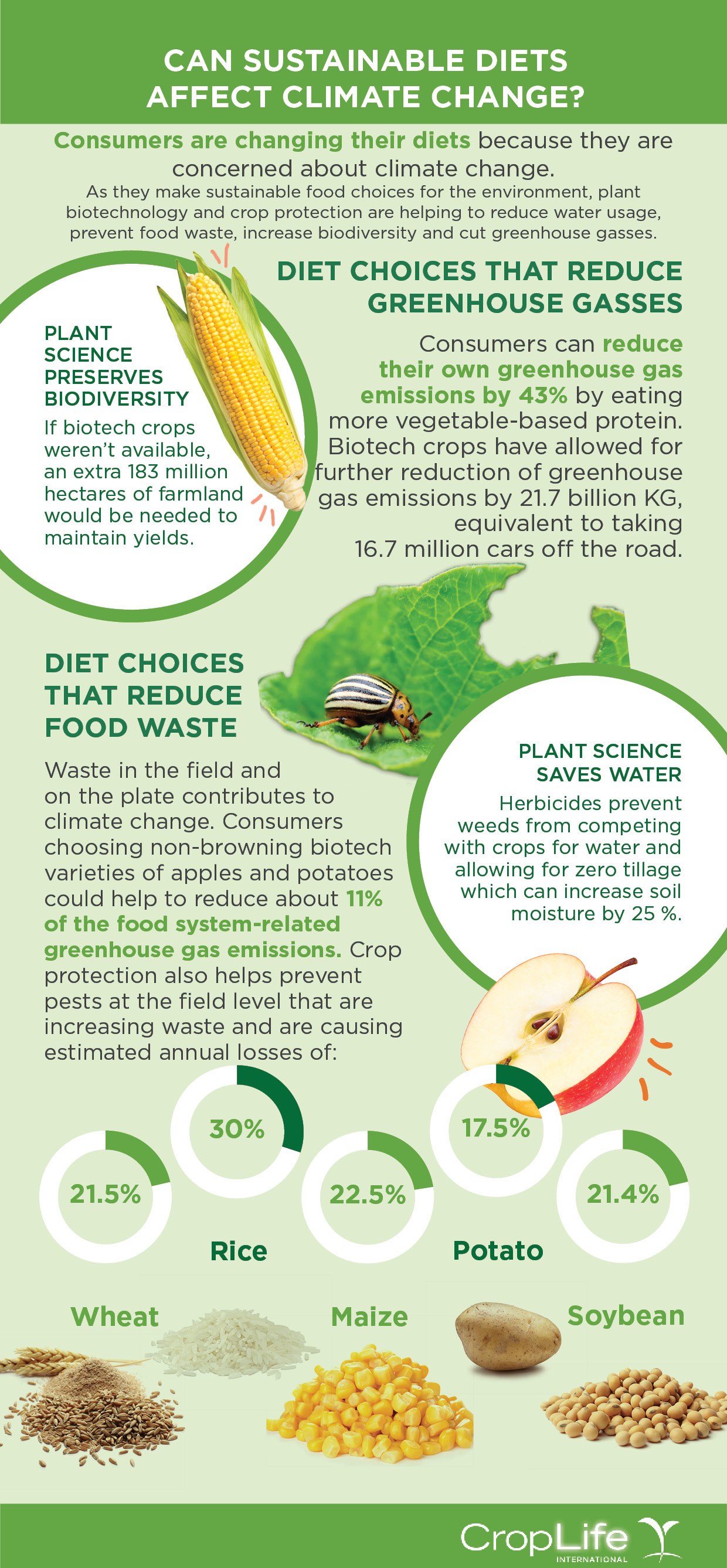By: CropLife International (CLI)
Plant biotechnology, crop protection, and sustainability go hand in hand.
Check CLI’s Instagram story on sustainable diets to learn more.
By: CropLife International (CLI)
Plant biotechnology, crop protection, and sustainability go hand in hand.
Check CLI’s Instagram story on sustainable diets to learn more.
By: CropLife International
Consumers are changing their diets to try and help mitigate climate change. As they make sustainable choices, plant science is helping too! Check out the infographic to learn how.

Download the PDF.
This content was taken from CropLife International website. You may check the link here.

The tie between agriculture, fabric, and clothing is stronger than many realize, especially in rural communities. Often, crops grown on the farm serve as feed for the animals whose wool is woven, crafted, or made into textiles and other garments.
The Inter-American Institute for Cooperation on Agriculture (IICA) partnered with fashion and lifestyle publisher Vogue and Corteva, an agriculture company, to photograph rural women in Latin American communities who rely on what they grow to support what they wear.
According to IICA, these women produce 51% of the food in Latin America. But while they spend their days on the land, they also devote their time to craftwork and caring for their families.
Celeste Valero, Edilberta Pica, Noemi Valero and Lucrecia Cruz – Jujuy, Argentina

All photos by Cecilia Duarte, Brazil

Artisan and creator of the Xanil brand, she learned to plant corn and sweet potato, to sell products at popular fairs, and to tell the story of Mayan culture through her embroidery.
Mayans were agricultural innovators. They used techniques like crop rotation and terraced planting to grow enough food to feed their cities. In Rutila’s community, agriculture is just as important now as it was to their ancestors.



Coyote, a Guatemalan artisan, farmer and philanthropist, wears traditional Mayan clothing.Each color representing a different aspect of her life and history.

By: CropLife International
If cotton disappeared, we would have to find a replacement for one of the most versatile natural materials on the planet. Farmers are doing their best to protect this useful crop, watch the video to learn how:
By: CropLife International
According to the USDA, Citrus Greening is one of the most serious citrus plant diseases in the world. The disease has devastated millions of acres of citrus crops throughout the world. Citrus greening is spread by a disease-carrying insect and once a tree is infected, there is no cure. Sick trees produce fruits that are green, misshapen and bitter, unsuitable for sale as fresh fruit or for juice and they usually die within a few years.
Nepalese researcher Kiran Timilsina discusses how we need to think outside the box to solve citrus greening. Watch the video to learn about his proposed solutions and the impact the virus is having on the citrus industry in Nepal:
Researchers in the United States are working to find solutions as well, learn about how genome editing could provide a fix for citrus farmers in Florida:
By: CropLife International
We rely on crops for more than just the food we eat – we also need them for the clothes we wear. More traditional textiles are made from crops like cotton and linen, but did you know fabric could be made from pineapples and bananas?
Unfortunately, these unexpected fiber crops are still susceptible to pests and diseases. Learn about these cool clothing crops and what plant scientists are doing to protect them:

Pesticides help protect this tasty and useful tropical fruit.

Plant science protects straw so it can protect you from the sun.

Saris can be made from banana silk and fungicides help keep this vegan silk alternative available.

Cork trees are susceptible to disease. Plant science keeps your shoes and those trees standing tall.

Nettles are hardy and can attract beneficial pest-predators as part of an Integrated Pest Management strategy.

CropLife Asia Calls on Region’s Stakeholders to Work Together to Address “Unacceptable” Food Crisis
United Nations’ Report on Food Security & Nutrition Highlights Troubling Trends in Asia
Singapore, 16 July 2019 – With the release of the 2019 State of Food Security & Nutrition in the World by the United Nations (UN), new data has come to light indicating hunger, undernourishment and obesity are at critical levels globally and throughout Asia in particular. In light of these troubling trends, CropLife Asia is now calling on the region’s food value chain stakeholders to work collectively to ensure a safe and nutritious food supply across the continent.
According to the UN research, some 820 million people did not have enough food to eat in 2018 – this is up from 811 million in 2017 and represents the third consecutive year of increase. Meanwhile, over 513 million of those hungry people (or over 62%) call Asia home. When it comes to undernourishment, the statistics are also discouraging. In 2018, the largest number of undernourished people around the world (more than 500 million) lived in Asia.
“The hunger and undernourishment trends taking place across Asia are simply unacceptable,” said Dr. Siang Hee Tan, CropLife Asia Executive Director. “In an age when Asia leads the way on so many fronts, this cold reality is a reminder we have much work yet to do.”
“The UN is to be commended for this research and raising awareness around this critical issue. It’s now time for the food value chain stakeholders in Asia to work together like never before to address this dilemma.
“While the technologies and innovations of plant science are part of the solution to feed our growing population, they’re only one part. The responsibility to ensure our region’s men, women and children have enough safe and nutritious food to eat is a shared one. The time is now for a renewed effort with the region’s governments, industry and civil society working together. The stakes are simply too high to not act now.”
Earlier statistics have also shown that obesity and overweight rates across ASEAN are particularly on the rise – especially among children. According to WHO data, the incidence of obese and overweight children across Southeast Asia has increased 150% since 2000.
The phenomena of rising undernourishment and obesity rates concurrently is commonly referred to as the ‘double burden’. In an effort to highlight this dilemma and discuss shared solutions, CropLife Asia partnered with the US-ASEAN Business Council and EU-ASEAN Business Council in 2019 to form the ASEAN Safe, Nutritious Food Alliance. This new group has conducted public-private sector dialogues in Bangkok and Hanoi thus far with key findings, shared solutions, and opportunities for greater partnership coming to light to better ensure safe, nutritious and abundant food supplies in Thailand and Vietnam respectively.
###
About CropLife Asia
CropLife Asia is a non-profit society and the regional organization of CropLife International, the voice of the global plant science industry. We advocate a safe, secure food supply, and our vision is food security enabled by innovative agriculture. CropLife Asia supports the work of 15 member associations across the continent and is led by six member companies at the forefront of crop protection, seeds and/or biotechnology research and development. For more information, visit us at www.croplifeasia.org.
For more information please contact:
Duke Hipp
Director, Public Affairs
CropLife Asia
Tel: (65) 6221 1615
By: CropLife International
How are we going to feed the world in 2050? Through sustainable, global agriculture solutions. Learn more with these Five Facts from the FAO about the population:




